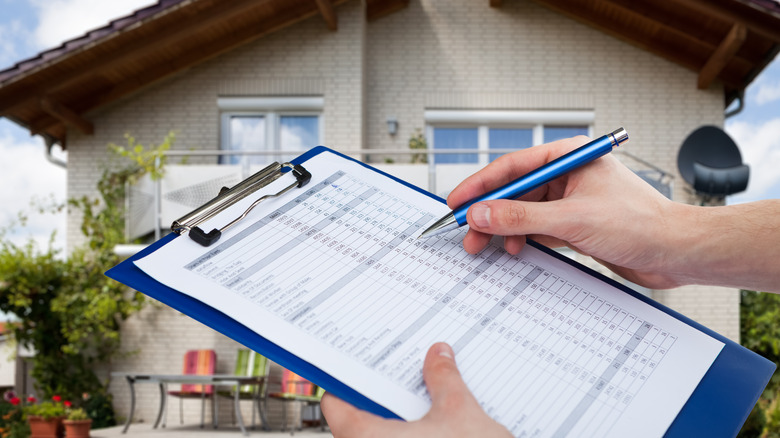The Easiest Way To Save On Property Taxes That You Never Knew About
With today's exorbitant real estate market and soaring inflation costs, you may be looking to save on whatever bills you can. And one fairly substantial bill that comes due every year for homeowners is the property tax bill. Whether you pay your property taxes all at once in a single lump sum, or you make escrow payments over the course of the year towards your anticipated future tax bill, property taxes are a considerable amount of money.
Before you can figure out ways to save on your property taxes, it helps to understand them better. Property taxes are calculated by multiplying the taxable value of your home by your local property tax rate, determined by the city or the county in which you live. According to Investopedia, your home's taxable value differs from its assessed value. Your home's assessed value is the value a tax assessor assigns to your home based on its size, age, location, type of construction, condition, and value relative to neighboring properties. Its taxable value is the assessed value minus any tax credits or exemptions.
If you know your home's taxable value and your local tax rate (also called the mill rate), you can calculate your anticipated property tax. First, divide the tax rate by 1,000. Next, multiply that number by your property's taxable value to learn how much you will be expected to pay in property taxes this year.
The quickest way to save on property taxes
The most efficient way for you to save on property taxes, as explained by Experian, is to find a way to appeal your property's assessed value. Assessed values and taxable values are all communicated via a document called a tax card, which is a public record you can request be provided to you. Check all of the information recorded on the tax card and dispute anything that is inaccurate — for example, if the tax card records your home as having more square footage than it actually does, this would increase your home's assessed value and subsequent tax bill.
Even if everything on your tax card is accurate, you may still be able to use tax cards to lower your bill. The key is to look at the cards for other properties and compare them to your own. As these are also public records, you should be able to easily access the assessed value information for your neighbors' properties. Check and see if properties similar in size and location to yours have been assessed at a lower value than your home. If that is the case, you likely have grounds to appeal your home's assessment. Similarly, if you find that properties with more amenities than yours, such as additional bathrooms or a second story, have been assessed at the same value as your home, you can argue the case that your home should be assessed at a lower rate.
Other ways to save on property taxes
While it may not be as straightforward as checking your tax card and appealing your property's assessed value, another way to potentially save on your annual property tax bill is to hunt for any applicable tax credits and exemptions, according to Experian. This method will take a bit more work, as exemptions can vary dramatically depending on the state and, in some cases, city or county in which your property is located. But a little work can go a long way in this regard when it comes to reducing your bill.
If you qualify as a senior citizen, however your state or municipality defines that term, you are likely eligible for a tax break. The same situation applies if you are currently serving in the United States Armed Forces or are an eligible veteran, or if you are living with certain disabilities (whether or not you acquired those disabilities through your service).
Some states have laws known as homestead exemptions, in which a household may not have to pay full property taxes if its primary income earner passed away in the previous year. Finally, if your property can qualify as special-use, you may be able to snag a tax credit. The special-use designation is typically reserved for properties that are being used for agricultural purposes or for charitable activities that fall under the umbrella of a nonprofit or religious organization.


